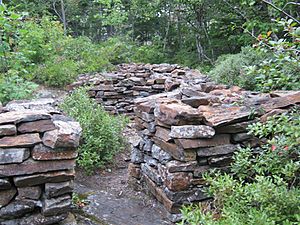Bayer's Lake Mystery Walls facts for kids
The Bayers Lake Mystery Walls are old stone structures. They are found in Halifax, Nova Scotia. No one knows for sure who built them or exactly when. This makes them a real mystery for people who study history and old places.
Contents
What Are the Mystery Walls?
The ruins include walls that form a small building with five sides. There is also a long wall, about 150 meters (nearly 500 feet) long, with ditches. Both are made from flat ironstone slate rocks. They sit on a hill looking over Bayers Lake Park.
Why are they a mystery? Experts have many questions about them. Some think the walls might have been a simple sheep pen. Others believe they had a military purpose, perhaps for training or defense. Because they are so important and mysterious, the walls are a protected archaeological site. This means they are kept safe under Nova Scotia's Special Places Act.
The land where the walls stand was first given to Johann Gotlieb Shermuller in 1762. It was a large piece of land, about 150 acres. Shermuller sold the property in 1770. After that, the land changed owners many times. However, it's unlikely the land was ever used for farming because of its rocky ground.
Protecting the Walls
In October 1990, a person named Jack McNab told local news about the site. This was important because the area was about to be cleared for the new Bayers Lake Business Park. His efforts helped save the walls from being destroyed.
Later, in 2013, the Nova Scotia Archaeology Society created a special group. This group, called Bayers Lake Walls Historical Site Advocacy, was formed because the site had been damaged by vandalism. They work to protect the walls.
Studying the Mystery
Many researchers have tried to learn more about the Bayers Lake Mystery Walls.
Early Investigations
In December 1990, Davis Archaeological Consultants started a small dig. They found some old items, but these items were thought to have been left there much later than when the walls were built.
From May to June 1998, students from Saint Mary's University also dug at the site. They found 118 items. They concluded that all these items were left within the last 70 to 90 years. This means the items didn't help figure out how old the walls truly are.
Lichen and Mapping
In December 1998, a scientist who studies lichen looked at the stone walls. Lichen are small plant-like growths on rocks. The way the lichen had grown suggested that the stonework had not been moved since around 1798. This gave a clue about the age of the walls.
In 2006, W. Bruce Stewart took photos of the walls. Then, on August 2, 2006, the walls were carefully mapped. Researchers used a special GPS unit to get exact locations for key parts of the walls. This helps create very accurate maps of the site.
Newer Research Methods
In March 2015, John Bignell suggested more ways to explore and protect the site. The Bayers Lake Walls Heritage Site Advocacy Committee was asked to make plans to protect and stabilize the walls. Funding was approved to use a special tool called an X-ray fluorescence (pXRF) system. This system helps analyze the soil around the site.
In 2017, the walls were examined with this X-ray fluorescence analyzer. Researchers were looking for high levels of phosphorus. Phosphorus would be expected if there had been human or animal waste, bones, or certain plants. However, they did not find high levels of phosphorus. This means the site might not have been used in ways that would leave such traces.
The Bayers Lake Mystery Walls continue to be a fascinating puzzle for historians and archaeologists in Nova Scotia.


